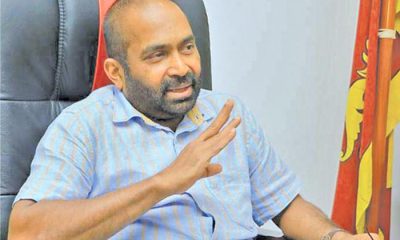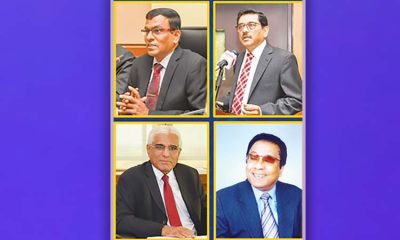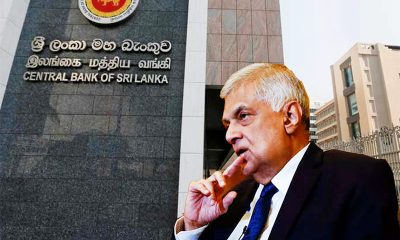Business
Current ‘discourse’ on CBSL salary revisions ‘extremely partial and based on personal agendas’

We, the Central Bank Executive Officers’ Union (CBEOU), as a professional union representing the Executive Officers of the Central Bank of Sri Lanka, wish to clarify some facts, as it was evident that the discourse on the recent salary revision of the Central Bank of Sri Lanka is extremely partial and raised without proper knowledge of the facts and / or based on mere personal agendas, the CBEOU said in a press release.
The release signed by the Union’s General Secretary M.N.P. Jayaweera and president, D.J. Perera, explains: ‘Central Bank of Sri Lanka was established as an independent institution since its inception. Accordingly, the previous Monetary Boards as well as the current Governing Board have been assigned the decision-making independence related to administration on a logical basis and that administrative independence remains the same for other central banks around the world.
‘Accordingly, since the inception, the Monetary Board decided the recruitment procedures, professional training and salaries related to the Central Bank service. It should also be mentioned that neither the previous Monetary Boards or the present Governing Board include the employees of the Central Bank, and that the members of the Governing Board are scholars and professionals in a variety of fields of the country. Considering the corporate governance practices, salary revisions have been done in every three years in the Central Bank of Sri Lanka for several decades as similar to certain state sector establishments.
‘The 2024-2026 collective agreement is an agreement reached by all parties after several rounds of bargaining between all the unions and the Governing Board of the Bank. Accordingly, all parties are bound to work under the terms of the collective agreement for the next three years.
‘It is no secret to society that salaries in the Central Bank of Sri Lanka are at an elevated level compared to other government services. Also, the Central Bank of Sri Lanka, which is the apex financial institution in the financial system that supervises licensed banks and registered non-bank financial institutions, must be compensated competitively in line with the institutions they supervise, in order to discharge their duties without influence. Due to this situation, the educated youth community of this country is eager to leave jobs in the government as well as private sector to join the Central Bank service. Students with a First or Second Upper-Class degree in a limited range of subjects are recruited to the Central Bank staff class after passing a highly competitive examination and interview(s). It is also a known fact that the passing percentage is exceptionally low for this entry examination.
‘Furthermore, unlike other government employees, there are many other limiting factors including legal barriers that make it impossible for the Central Bank professionals to use their professional qualifications to set up private practice. Since, the Central Bank is not a commercial institution and is a closed service, the promotion opportunities available to Central Bank employees are rather limited.
‘It is a generally accepted opinion that if there are limiting factors related to a service, a specific payment (compensation) should also be made related to that service. Further, the salary of a particular job is determined based on the responsibilities pertaining to its delivery, the qualifications to be met and the demand/supply for the job in the labor market. Based on the knowledge and practice of central bankers, their potential job market will be the financial sector or monetary policy making within or outside the country. In the past year alone, the Central Bank of Sri Lanka has lost nearly a hundred officers of its wealth of human capital, and the fact that some have joined international organizations including the World Bank and its affiliates, Bank of England, and the Commonwealth Secretariat, etc. is a confirmation of such movements.
‘If this salary revision did not take place, a considerable number of the remaining officers would have left the Central Bank of Sri Lanka as well as the country and the Bank’s activities could have been severely disrupted. It is such a pity that the ongoing criticisms utterly disregard this reality. It is not clear why those who raised their voice over the possible brain drain in the past are raising their voice against the measures taken to prevent it from happening.
‘Moreover, in a backdrop of no revision of pensions, the fact that the pensions of Central Bank pensioners have been increased by about 70% is a complete fallacy, and it is apparent that such news was purposely planted in the society to tarnish the image of the Central Bank of Sri Lanka in the face of personal agendas of certain parties.
‘For the progression of a society, existence of rational discourse is beneficial, but we can clearly observe the political and personal agendas operating under the guise of the one-sided dialogue in the society at present. In view of the inflation and existing tax burden in the country, private institutions including some private banks have taken various measures to avoid the inconvenience caused to their employees, and it is the opinion of our union that salaries should be revised in other sectors including government institutions.
‘Even though it has been proclaimed through a Supreme Court decision as to who holds responsibility for the country’s economic crisis, basis for accusing the Central Bank officials as “economic hit men”, should be explained by the so-called politicians before the society. Similarly, if there are (or were) such officers, there is no impediment in taking appropriate disciplinary actions against such individuals through an independent investigation and such an independent investigation process will definitely receive the fullest support of our professional Union.’
Business
HNB Assurance delivers industry leading 42% revenue (GWP) growth and 28% rise in profits (PAT)
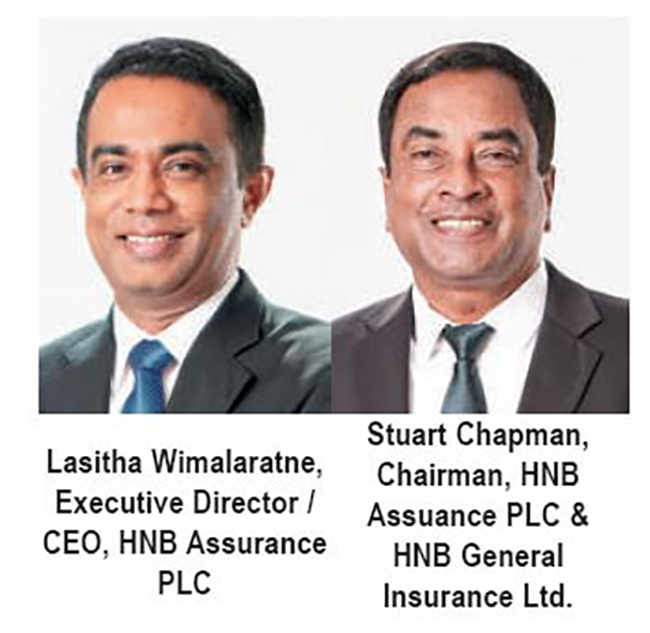
HNB Assurance PLC reported an outstanding financial performance for the year ended 31st December 2025, delivering a 42% year-on-year growth in Life Insurance Gross Written Premium (GWP), this along with the growth rate in Renewals are the highest in the industry.
Life GWP reached Rs. 19.49 Bn compared to Rs. 13.71 Bn in 2024, reflecting strong New Business generation and Renewal Collection. Net Written Premium grew even faster at 43% to Rs. 18.44 Bn, highlighting the quality and sustainability of the Company’s topline expansion.
Commenting on the results, Chairman Stuart Chapman stated, “The year under review was marked by gradual macroeconomic stabilisation, improved investor sentiment and a more predictable policy environment. Although the economy continues to recover from prior volatility, we are beginning to see renewed financial confidence among individuals and businesses. Against this backdrop, HNB Assurance has delivered strong growth in both revenue and profits, while maintaining robust capital adequacy and prudent risk management. Our improvement in top line, profitability and balance sheet strength demonstrates the resilience of our business model and our ability to navigate changing economic conditions which are reflected in an ROE which increased to 18.5% from 16.9% a year earlier.”
Profit Before Tax increased by 28% to Rs. 3.03 Bn from Rs. 2.36 Bn in the previous year, while Profit After Tax (including Life Surplus Transfer) rose by 28% to Rs. 2.12 Bn compared to Rs. 1.66 Bn in 2024. Earnings Per Share improved by 28% to Rs. 14.15 from Rs. 11.04, reinforcing the Company’s ability to consistently translate business growth into enhanced shareholder value. In line with this strong performance, the Board of Directors has proposed a first and final dividend of Rs. 5.00 per share for 2025, representing a 28% increase over the Rs. 3.90 per share declared in the previous year.
Executive Director and Chief Executive Officer Lasitha Wimalaratne highlighted the consistency of the Company’s upward trajectory. “Our 2025 performance reflects a sustained pattern of high growth and disciplined execution over the past four years. During this period, we have consistently strengthened our distribution reach, enhanced advisor productivity, invested in digital enablement and sharpened our customer centric value proposition. Each year we have built on the previous year’s gains, and the 42% growth in Life GWP in 2025 is the strongest affirmation yet of that strategy. Importantly, we have achieved this while maintaining underwriting discipline, expanding our Life Fund and delivering a 28% increase in PAT.”
The strength of the Company’s balance sheet continued to improve during the year. Total Assets grew by 28% to Rs. 68.44 Bn from Rs. 53.40 Bn, while financial investments increased by 29% to Rs. 62.49 Bn from Rs. 48.49 Bn in 2024, reflecting disciplined asset accumulation and prudent investment management. Total Equity rose to Rs. 12.19 Bn from Rs. 10.81 Bn, supported by Retained Earnings which grew by 18% to Rs. 10.23 Bn.
The Life Insurance Fund recorded a significant expansion of 27%, increasing to Rs. 48.87 Bn from Rs. 38.34 Bn in the previous year. During the year, the Company paid Rs. 4.40 Bn in Net Insurance Benefits and Claims, honouring its commitments to policyholders and their families while further strengthening long term reserves. Investment Income remained a key contributor to performance, with interest and dividend income rising by 10% to Rs. 7.49 Bn.
The Market Capitalisation as at the end of the year stood at Rs. 17.21 Bn up 43% from a year ago when it was Rs. 12.02 Bn, while trading for year ended at Rs. 114.75 per share increasing by 43% from Rs. 81.10 a year ago.
Business
Phoenix Ogilvy Dominates Sri Lanka’s Creative Rankings
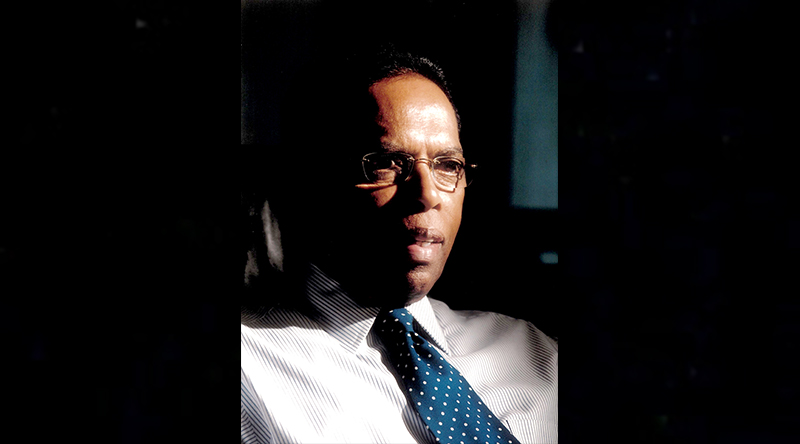
Standout year with international award show wins at LIA, One Asia, Clio, AdFest, Spikes Asia & The Work
Phoenix Ogilvy has been named 2025 Sri Lanka Agency of the Year after topping The Campaign Brief Asia’s Creative Rankings as the most internationally awarded agency in the country, an agency news release said..
The agency’s ranking also marks Sri Lanka’s return to the list in 2025, following the country’s absence from it the previous year.
The Campaign Brief Asia Creative Rankings annually evaluate the top 100 most awarded creative agencies in Asia, based on their achievements across leading international award shows.
The rankings are widely regarded as one of Asia’s most credible measures of creative excellence. Agencies accumulate points purely from award wins across major international creative shows, making it one of the longest-running and most respected benchmarks of creative performance in the region.
Phoenix Ogilvy secured the top spot in the national table, amassing an impressive 295 Creative Ranking points after standout wins across six major international creative award shows, including London International Awards (LIA), One Asia Awards, Clio Awards, AdFest, Spikes Asia, and Campaign Brief’s The Work.
Being ranked at the top not only signals national creative leadership for Phoenix Ogilvy but also exhibits the agency’s talent strength. In a testament to this creative calibre, the agency’s talent dominated the Campaign Brief Asia’s Individual Creative Rankings in Sri Lanka.
Leading this list is Nadeera Warawita with 250 Creative Ranking points, followed by Sakuna Ranasinghe at No. 2 with 220 points, and Samitha Kaushalya at No. 3 with 150 points. Meanwhile ranked jointly at No. 4, are Dilshi Aberaja, Dilshard Ahamed, Harsha Kumara, Kasun Wadumestri, Keshan Silva, and Suresh Kumar. At no. 10 is Dilshi Thathsarani.
Speaking on these achievements, Irvin Weerackody, Chairman of the Ogilvy Group Sri Lanka, said, “Creativity has always been our lifeblood, and it is encouraging to see that commitment recognised on the world stage. The real test of an agency is not the trophies, but the courage to create with integrity, especially today. These achievements not only reflect the capability of our talent, but importantly their discipline, their cultural instinct and their refusal to take the easy way out. I am proud of our teams, who continue to push themselves year after year to raise the bar and uphold the standards we believe in.”
For five decades, Phoenix Ogilvy has been a defining pillar of the country’s marketing landscape and an influential creative powerhouse. From its earliest days, the agency has challenged convention and advocated brave thinking, producing work that commands attention, both locally and internationally.
Renowned as a formidable training ground for Sri Lankan advertising talent, the agency has also played a pivotal role in shaping generations of trailblazing creatives, strategic thinkers, and industry leaders who continue to leave their mark across the region and beyond.
Strengthened by the global Ogilvy network, the agency enjoys a rare blend of global creative rigour and deep local intelligence. Over the years, it has diversified across multiple disciplines and today stands as a talent hub for 290 industry specialists spanning creative, strategy, digital, media, public relations and integrated communications in Sri Lanka.
At its core, the agency remains true to the principles it was built on: that great ideas come from disciplined minds, uncompromising craft, and the refusal to settle for the ordinary.
Business
Oak Ray Chef Marks a Culinary Milestone with 118 Unique Creations

In the intricate world of pastry and bakery arts, R.S. Weerakoon has emerged as a visionary creator, known for his extraordinary ability to transform any concept into a stunning cake masterpiece. Currently serving as the Head Chef (Pastry & Bakery) at the Oak Ray Group in Kandy, Weerakoon’s journey is a blend of local talent and international expertise.
An alumnus of Udispattuwa Maha Vidyalaya, Weerakoon holds an NVQ Level 04 qualification from NAITA and is a distinguished member of the Chefs’ Guild of Sri Lanka. With over 14 years of experience in the industry, including valuable tenures in Kuwait and Oman, he has successfully integrated Middle Eastern culinary trends with local flavors.
One of his most significant contributions to the industry is the introduction of 118 unique products to the Oak Ray Group. Remarkably, all these creations are made without the use of any artificial food colorings, prioritizing the health and well-being of consumers.
Speaking about this talented professional, the Chairman of the Oak Ray Group, Mr. Sujeewa Palliyaguruge, stated that his vision is to provide a creative platform for such skilled young individuals.
“Our goal is to allow talented creators like Weerakoon the freedom to innovate and bring their unique visions to life, which ultimately benefits the entire culinary industry in Sri Lanka,” he said.
Weerakoon’s dedication to natural ingredients and his mastery of cake architecture continue to set new benchmarks for the next generation of chefs in the hill capital.
- R.S. Weerakoon
By S.K. Samaranayake
Pix by Razik Jabbar
-

 Features6 days ago
Features6 days agoLOVEABLE BUT LETHAL: When four-legged stars remind us of a silent killer
-

 Business6 days ago
Business6 days agoBathiya & Santhush make a strategic bet on Colombo
-

 Business6 days ago
Business6 days agoSeeing is believing – the silent scale behind SriLankan’s ground operation
-
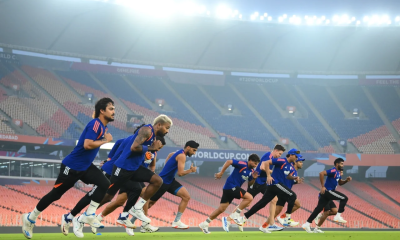
 Latest News7 days ago
Latest News7 days agoIndia, South Africa meet in the final before the final
-

 Features6 days ago
Features6 days agoProtection of Occupants Bill: Good, Bad and Ugly
-
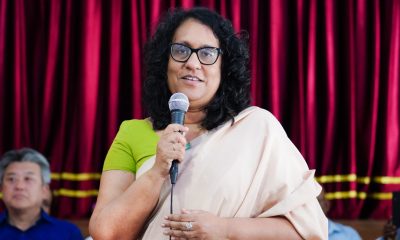
 News6 days ago
News6 days agoPrime Minister Attends the 40th Anniversary of the Sri Lanka Nippon Educational and Cultural Centre
-
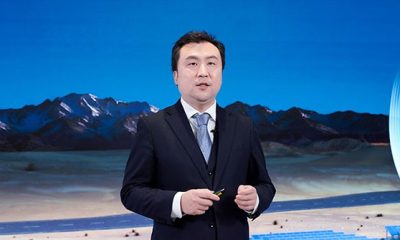
 Business6 days ago
Business6 days agoHuawei unveils Top 10 Smart PV & ESS Trends for 2026
-

 News6 days ago
News6 days agoCoal ash surge at N’cholai power plant raises fresh environmental concerns






